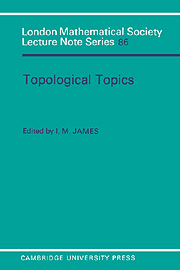 Topological Topics
Topological Topics Book contents
- Frontmatter
- Contents
- Publications of P.J. Hilton
- Essay on Hilton's work in topology
- The work of Peter Hilton in algebra
- The dual Whitehead theorems
- Homotopy cocomplete classes of spaces and the realization of the singular complex
- Betti numbers of Hilbert modular varieties
- Homotopy pairs in Eckmann-Hilton duality
- Profinite Chern classes for group representations
- Automorphisms of surfaces and class numbers: an illustration of the G-index theorem
- The real dimension of a vector bundle at the prime two
- Maps between classifying spaces, III
- Idempotent codensity monads and the profinite completion of topological groups
- Finitary automorphisms and integral homology
- Finite group actions on Grassman manifolds
The dual Whitehead theorems
Published online by Cambridge University Press: 07 December 2009
- Frontmatter
- Contents
- Publications of P.J. Hilton
- Essay on Hilton's work in topology
- The work of Peter Hilton in algebra
- The dual Whitehead theorems
- Homotopy cocomplete classes of spaces and the realization of the singular complex
- Betti numbers of Hilbert modular varieties
- Homotopy pairs in Eckmann-Hilton duality
- Profinite Chern classes for group representations
- Automorphisms of surfaces and class numbers: an illustration of the G-index theorem
- The real dimension of a vector bundle at the prime two
- Maps between classifying spaces, III
- Idempotent codensity monads and the profinite completion of topological groups
- Finitary automorphisms and integral homology
- Finite group actions on Grassman manifolds
Summary
For Peter Hilton on his 60th birthday
Eckmann-Hilton duality has been around for quite some time and is something we now all take for granted. Nevertheless, it is a guiding principle to “the homotopical foundations of algebraic topology” that is still seldom exploited as thoroughly as it ought to be. In 1971, I noticed that the two theorems commonly referred to as Whitehead's theorem are in fact best viewed as dual to one another. I've never published the details. (They were to appear in a book whose title is in quotes above and which I contracted to deliver to the publishers in 1974; 1984, perhaps?) This seems a splendid occasion to advertise the ideas. The reader is referred to Hilton's own paper [2] for a historical survey and bibliography of Eckmann-Hilton duality. We shall take up where he left off.
The theorems in question read as follows.
Theorem A. A weak homotopy equivalence e :Y → Z between CW complexes is a homotopy equivalence.
Theorem B. An integral homology isomorphism e :Y → Z between simple spaces is a weak homotopy equivalence.
In both, we may as well assume that Y and Z are based and (path) connected and that e is a based map. The hypothesis of Theorem A (and conclusion of Theorem B) asserts that e*:π*(Y) → π*(Z) is an isomorphism. The hypothesis of Theorem B asserts that e*:H*(X) → H*(Y) is an isomorphism. A simple space is one whose fundamental group is Abelian and acts trivially on the higher homotopy groups.
- Type
- Chapter
- Information
- Topological TopicsArticles on Algebra and Topology Presented to Professor P J Hilton in Celebration of his Sixtieth Birthday, pp. 46 - 54Publisher: Cambridge University PressPrint publication year: 1983
- 3
- Cited by
